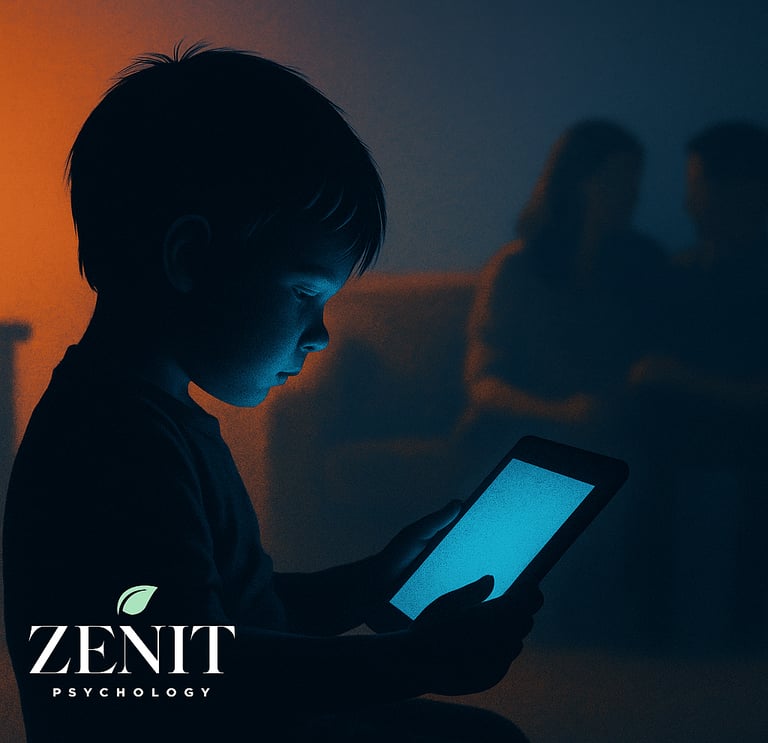The Impact of Social Networking on Young People
Early and unlimited access to social networks is reshaping the lives of today’s youth. This article explores the hidden risks, the warning signs that shouldn’t be ignored, and the crucial role parents play in guiding children through a digital world that never pauses.
ARTICLE
Lic. Arlenys Garcia
9/1/20253 min read


The Impact of Social Media on Young People: What We Are Ignoring
We live in a society where children have access to technology earlier than ever before. It has become normal to see a child under the age of seven with a cell phone or tablet in hand. Those who don’t have one are considered “behind.” They download apps, browse social networks, and play on platforms that may look harmless but actually pose serious risks. And all of this often happens without supervision, without limits, and without adult guidance.
For many parents, handing over a tablet or phone has become a quick fix—an easy way to keep children entertained in the middle of hectic schedules filled with work, errands, and responsibilities. But what’s often missing are clear boundaries: Which apps are safe? Who are they talking to online? What information are they sharing?
The Silent Dangers
This lack of control has opened the door to silent dangers. Take Roblox, for example—a game that seems innocent because it allows children to create and explore virtual worlds. Yet, cybersecurity experts and psychologists have warned how its open design can also be exploited by people with harmful intentions to approach minors, manipulate them, and even gain access to private information. While not every child who plays is at risk, the absence of regulation makes these platforms fertile ground for abuse.
Another growing concern is how our fast-paced lifestyles contribute to the problem. Parents are constantly rushing, and in that whirlwind, children spend endless hours in front of screens without opportunities for quality time, meaningful conversations, or real connection. It’s no longer just about playing games or watching videos; it’s about losing human contact—eye contact, heart-to-heart talks, and moments of reflection.
What the Research Shows
Psychologists have been raising the alarm for years. Studies published in the Journal of Adolescence and the work of Jean Twenge (iGen) show how excessive screen time is directly linked to higher levels of anxiety, depression, and social isolation in adolescents.
Sherry Turkle, MIT professor and author of Alone Together, explains that digital hyperconnection gives us the illusion of companionship while actually isolating us emotionally.
Jean Twenge, psychologist and author of iGen, found that the generation raised on smartphones is more vulnerable to emotional struggles due to overexposure to screens and fewer face-to-face interactions.
The American Psychological Association (APA) warns that early, uncontrolled access to social networks increases the risk of cyberbullying, grooming, and self-esteem issues.
The problem is that many parents, in the middle of life’s rush, fail to recognize the warning signs. Behavioral changes, social withdrawal, loss of interest in offline activities, and excessive time online aren’t just “teenage phases”—they are red flags that require attention.
The Real Issue
It’s important to clarify: social media and video games are not the enemy. In fact, they can be powerful tools for education, creativity, and even positive social interaction. The true danger lies in overuse and lack of limits—when children are left without guidance, filters, or honest conversations to help them distinguish between reality and the digital world.
Because the truth is this: Instagram life is not real life. It is an edited, filtered, and carefully curated version of reality. If we don’t explain this to our children, they may grow up believing everything they see is true—leading to comparison, frustration, and feelings of inadequacy.
Where Are We Heading?
If we stay on this path, in the next five years we’ll see a generation of young people increasingly dependent on digital validation, with weaker face-to-face communication skills and higher rates of anxiety and depression.
In ten years, these children may become adults struggling to tolerate frustration, unable to wait patiently, and unprepared to build healthy offline relationships. Families may drift apart—not out of lack of love, but out of lack of shared time.
The Way Forward
The key is not prohibition, but education and guidance. Parents must accompany, supervise, and set clear boundaries:
Limit screen time.
Check which apps children are using.
Encourage open conversations about what they see online.
Teach them, clearly and without fear, that not everything on the internet is real.
The digital world can absolutely be positive—if it is used responsibly and in balance. But we must never forget the most important truth: real life happens here, in our homes, at the dinner table, in conversations, in hugs, and in the time we share with one another.
—Lic. Arlenys García
Mental Health is a priority.
Close, practical and emotionally transforming psychology.
Need help or have questions?
Write or call us with confidence:
📞 +1 849 354 2905
✉️ info@zenitpsychology.com
© 2025 Zenit Psychology. All rights reserved.
Your data is protected. We do not share your information with third parties.
